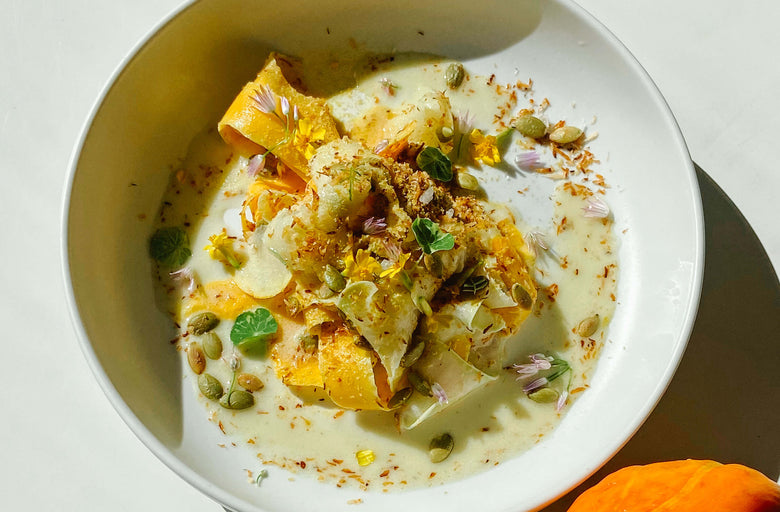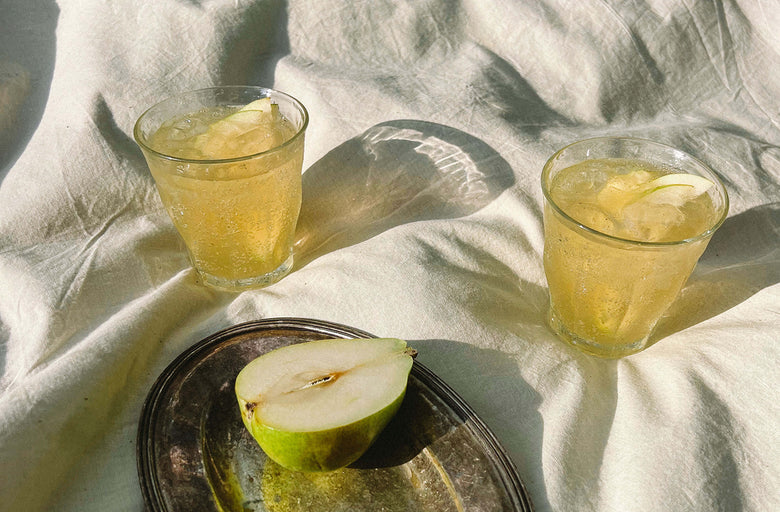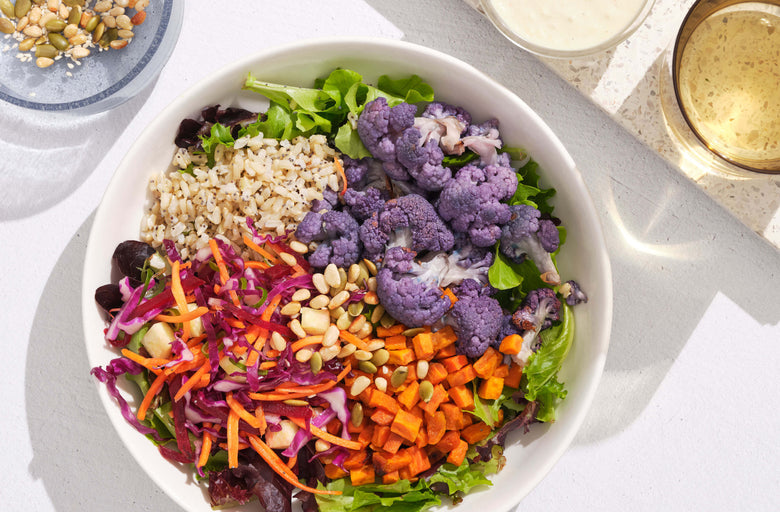Any good physician will tell you that loading up on a variety of fruits and vegetables is essential for your physical well-being. Dr. Drew Ramsey takes it one step further— he’s dedicated his life to understanding how our longevity, specifically within our brain, memory, and aptitude, can hinge on what is on the end of our fork. He’s working to tear down stigmas of mental illness, and use food as medicine to fight depression, dementia, anxiety, and addiction. And the food he finds most potent? Plants! On his own farm in Indiana, he sows all sorts of varieties of leafy greens, rainbow vegetables, roots and beyond. We sat with him and dove deep into the miracle of Mother Nature, why we all need to open the conversation up about our collective mental state, and the grocery list for a thriving mind.
DR. DREW RAMSEY, MD, PSYCHIATRIST, AUTHOR, FARMER
To start, can you share a little bit about your career focus and passion within medicine?
I am really interested in how doctors integrate food and nutrition into mental health care. Why don’t psychiatrists prioritize food the way it’s prioritized in other fields of medicine, like cardiology or gastroenterology? In my opinion, psychiatry and mental health professionals haven't paid enough attention to food. How do we help people integrate food into their plans for mental health care?
I'm also really interested in how we influence the conversation in mental health in media to really do our best to fight stigma, and how we talk about mental health. Specifically, how we open up the conversation with a crisis that we all know is going on in our country. It's a top headline whether it's the opioid or suicide epidemic, or kids going back to school with lots of anxiety and depression. Reading about it is a huge step forward, but I really want to make sure that for both me and my family, my community, but also all of my patients, that we live in a world where we can talk about how we feel and what that means to us, and what our goals are in a very open and frank way, and that hasn't been the case.

Why does the brain need plants?
First off, there are lots of nutrients that you find primarily in plants: Vitamin C, Folate, minerals like Magnesium. There are also compounds called phytonutrients that we only find in plants. But I think the thing that has everybody really interested and excited is how plants affect your microbiome. There is a whole lot of information around how our gut health influences our brain health, and that's just kind of intuitively true, right? When your gut's not right, your emotional and mental health isn't right.
On top of that, we need a healthy gut to absorb all the nutrients our brain needs, and plants are a key ingredient to making that happen. As a clinician, I get asked all the time, "What's your prescription for a healthy gut?" And mine is a really simple, two-step plan: people need to eat more plants, and they need to eat more fermented foods. Fermented foods like kefir, yogurt, kombucha, kimchi, sauerkraut create a healthy microbiome by seeding the gut with live cultures and healthy bacteria.
Bacteria can be a really hard thing for doctors to talk about. People like doctors because we kill bacteria. That's basically what put us on the map. If you have an infection, we're gonna kill it. And then you're gonna be healthier and happier. So for a long time, that's what we did. Now there’s been a real shift and doctors are beginning to ask questions like, "Hey, how do we actually feed you bacteria? How do we promote diversity within the bacteria that's in your gut? And how do we promote health that way?"
It's a very exciting time, and there's still a lot to learn and more research to be done, but one thing is true: if you make plants a central part of your diet, you're going to have a healthier gut, and overall, you're going to have a healthier brain.
 Can you share the healing power of plants when it comes to memory and cognition?
Can you share the healing power of plants when it comes to memory and cognition?
As many people age, they naturally start worrying about memory and cognition, which is our ability to remember things, our ability to think and have what's called executive function. To plan out your day and execute it. Dementing illnesses, whether it's Alzheimer's or vascular dementia, usually begin as early as the forties and fifties. We're starting to understand these disease processes take place over decades. There is not a lot of data about how to prevent these debilitating illnesses, but some of it looks at our dietary pattern—what we eat week-to-week. When individuals eat a more Mediterranean style diet— which is a lot more plant-centric than the standard American diet— you see a vastly decreased risk of dementia—about 40% decreased rates.
Plants help us with our brain health because plant-based diets are naturally less inflammatory. Plant-based diets are lower in simple sugars, lower in processed chemicals and non-food. If you eat a lot of plants you're not going to be ingesting food dyes or as many preservatives, and you’re going to avoid trans fat. Plants are also mainly water. That’s one of the things that I really like about prescribing plants—I don't have to tell people to drink eight glasses of water because I know they're "eating their water" as Sakara would say.
What are your thoughts on the organic vs non-organic debate?
This is a big question people have—I get it all the time. And I can tell you what I tell my patients. Number one: Eat more plants. For a lot of people, throwing that organic label in there, complicates things. I spend part of my time in rural Indiana. I was at the grocery store yesterday, and nothing that was organic. So should I not buy my kids some celery? Or mango? Or a green pepper? No, I'm still going to buy those things. I like to reference the Environmental Working Group’s “Dirty Dozen” and “Clean Fifteen” as a guide of what you should buy organic. For example, kale costs maybe a dollar more for an organic bunch. It’s a leafy green and it tends to have more pesticide residues on it. Also, the guide recommends eating organic when it’s a food in which you eat the skin, like a blueberry. Better to buy it in season or frozen and to go organic.
But if you can't afford organic, is it better to eat blueberries that are conventional or not eat them at all? I'm always in favor of people eating plants. It’s really important for us to focus on folks improving the overall nutrient density of their diet as a first step, then we can talk organic.

What should we be eating for improved brain health?
Let's talk about Brain Food 101. This might sound a little nutty, but stay with me: first, consider the idea that your brain is made of food. Think about it: all the molecules up there, all the carbon, nitrogen, zinc, and magnesium comes from food. I believe that the only molecule up there that doesn't come from the end of your fork is the oxygen that you breathe. I like that as a fundamental eater principle, right? You look at the end of your fork and ask yourself, is this what I want to put in my brain?
There are things that we know you should want to make your brain out of: foods that are really high in long-chain omega-3 fats, lots of zinc, magnesium, and folate. These are all nutrients that are very, very clearly linked to depression—specifically having lower levels of them in your body. If you don't get enough of those nutrients in a population [of people], then that population has lower moods and more depression. Or when individuals have depression they often deal with lower zinc, lower magnesium, or a folate deficiency, and don't recover as fast from a depressive episode.
There is also increasing data that certain foods and nutrients help our brain grow and recover from injury. It's a process called neuroplasticity, which means that your brain is constantly growing and evolving and new connections are getting made. Certain nutrients, like zinc, long-chain omega-3 fats, certain phytonutrients induce more of that master hormone that controls neuroplasticity, which is called BDNF or Brain-Derived Neurotrophic Factor. One of the big lessons in my e-course “Eat to Beat Depression,” is asking people to shift away from thinking about happiness. Instead, we should begin to think about neuroplasticity, and that your brain is this growing, changing evolving organ. Little decisions that you make every day—which include what you put into your body—affect the size of your brain when you're older. They affect your risk of serious illnesses, like depression and dementia.
There's a direct connection between food and brain health since our brains are made of food. There's the notion that food really helps adjust how much our brain grows or shrinks. I think there's just that fundamental notion that food really connects us. And nothing in my clinical experience helps people feel happier or healthier than being connected and connected to a community. And that's really what the brain does, the brain is an organ of connection. Those are some of the ways that I think food really influences brain health. Because if we think about it, what connects us like food does?
How are you helping to break down stigma around mental health? Why do you think that’s so important?
There's a lot of conversation about mental health these days and that's great. Stigma is the idea that if you heard I had gout, you wouldn't think that differently of me. And you probably wouldn't think that the gout was my fault, and you wouldn't tell me to go do yoga to get over my gout. But if I told you that I had clinical depression you'd think about me a little differently. Or if I told you that I had a psychotic depression. Or if I told you that I struggled with heroin dependence. When we think about mental health conditions we look at individuals differently, and that's stigma. Stigma shuts down conversation. It means that we're not going to have open and honest conversations about things that we know every family in America is struggling with. Because of that, we then have secrets we need to keep. And that really is underneath some of the epidemic that we see.
It's not that we don't have solutions to mental health problems. I like treating depression, because people get better. I don't feel that there's not a way to treat these illnesses. The concern is that many people don't have access to proper treatment, and that people just don't even come to treatment because they think I'm only going to give them a pill, or they don't want to see a shrink, because they're going to be labeled as crazy. That's stigma.
It's by the language that we choose, it's by really taking a step back when we have that impulse to give a lot of advice with people who are struggling with their mental health. We need to listen, and ask how we can be helpful. I see a lot of patients, for example, who are taking a little bit of medicine, and their yogi keeps telling them, "You should stop your meds." That's not helpful. That promotes stigma. A great alternative would be to ask, "Hey, tell me about your mood, and what happened that you're taking some medicine." That creates dialogue and healing.
 How do we help people we love, change their habits? The evidence is all there that plants boost your mood and promote a healthy heart. How do we encourage our parents, our family?
How do we help people we love, change their habits? The evidence is all there that plants boost your mood and promote a healthy heart. How do we encourage our parents, our family?
It’s about starting small and helping people get creative, explore what's available to them, and what's accessible to them. For example, one of my favorite meals is spaghetti and meatballs. I’m not even talking gluten-free spaghetti, although that's usually what we use. I just like spaghetti and meatballs. How do you make that meal healthier? It's not hard. Put a carrot in it with your meatball, right? Make sure there's a ton of veggies in that sauce. Use a gluten-free pasta or zucchini noodles. Use a grass-fed beef, or make lentil meatballs. Now, I’ve increased the nutrient density of that dish, I've added lots of plants in. So, instead of telling someone, Hey, don't eat spaghetti and meatballs—it’s just empty carbs and meat, we’ve worked them to create something that occasionally, can be a really, really, healthy part of someone's diet.
There's this notion that food needs to be this demon, and we have to control all of our urges and cravings for sugar. I don't like fear-based models when it comes to how we help people eat. I like joy-based models. Let's really fill your life with food joy.
Why do you personally eat plants?
I eat a lot of plants because I think plants are a miracle. My love of them comes specifically from planting seeds in the ground, and watching little speck of a black seed becoming this amazing kale plant. Or these little tiny pumpkin seeds that I ordered online this year, and now the pumpkins are the size of a chair. It blows my mind every time that, this just happens. You put the seeds in the ground, the water and the sun come, and we get food. It feels very spiritual to me, and it feels very clear that through eating those plants, I feel great. Tending to those plants makes me very happy. Basing my life around more plants has really only led to good things for me.
On top of that, I really like how plants taste and all the varietals. When I first started fiddling with kale, we ordered all of the types of kale we could find on the internet, close to 54 of them. I grew all of them, and they're all a little bit different. Tomatoes, just dozens of varieties. Now we can all see glimpses of this at your farmer's markets you're seeing all these different varietals. But it's just really quite spectacular to be surprised and meet new plants.






